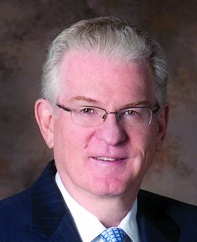By Bob Allen
The top official for Southern Baptist churches in Oklahoma quickly denounced a federal judge’s Jan. 14 ruling that the state’s ban on same-sex marriage is unconstitutional.
U.S. District Judge Terence Kern of the Northern District of Oklahoma said in a 68-page ruling that a 2004 amendment to the state constitution defining marriage as between a man and a woman and denying recognition of same-sex marriages performed in another state violates the Equal Protection Clause of the 14th Amendment to the U.S. Constitution by discriminating against a class of citizens because of their sexual orientation.
 Anthony Jordan, executive director of the 1,800-church Baptist General Convention of Oklahoma, said in a statement released through the Baptist Messenger, the ruling “flies in the face of the biblical and historical meaning of marriage, the wisdom of the ages and the resounding democratic choice of the people of this great state.”
Anthony Jordan, executive director of the 1,800-church Baptist General Convention of Oklahoma, said in a statement released through the Baptist Messenger, the ruling “flies in the face of the biblical and historical meaning of marriage, the wisdom of the ages and the resounding democratic choice of the people of this great state.”
Judge Kern issued a stay on his own ruling, pending outcome of a nearly identical case out of Utah already on appeal to the 10th U.S. Circuit Court of Appeals.
Oklahoma voters approved the marriage amendment in a ballot measure in November 2004 by a 76 percent to 24 percent margin. Similar initiatives were adopted the same year in Arkansas, Georgia, Kentucky, Michigan, Mississippi, Montana, North Dakota, Ohio, and Utah.
Numerous Southern Baptist Convention leaders in comments to Baptist Press called the 2004 election a win for traditional morality and a tribute to the success of the iVoteValues.com initiative led by then-Ethics and Religious Liberty Commission head Richard Land.
But Judge Kern, nominated to the federal bench by President Clinton, said the Oklahoma law results in “intentional discrimination” against same-sex couples because it “was adopted at least in part because of, and not merely in spite of, its discriminatory effect on a particular class of persons.”
The judge said not all intentional discrimination by a state violates equal protection principles, but it must have a “rational” purpose.
“The court recognizes that moral disapproval often stems from deeply held religious convictions,” Kern wrote. “However, moral disapproval of homosexuals as a class, or same-sex marriage as a practice, is not a permissible justification for a law.”
Kern recognized “that Oklahoma has a legitimate interest” in upholding the institution of marriage to increase the likelihood that children will be born into a stable home and because those born out of wedlock often create a financial burden on the state. He failed to see, however, how the “exclusion of the disadvantaged group from state-sanctioned marriage” advances that interest.
While procreation is one purpose of marriage, as the state argued, Kern said it is not the only one. There is no requirement for heterosexual couples to have children, he said, and same-sex couples, while not able to “naturally procreate,” can and do have children by other means.
He also questioned the state’s premise that allowing gay couples to wed undermines the “ideal” family unit, defined as “a family headed by two biological parents in a low-conflict marriage.”
“Excluding same-sex couples from marriage has done little to keep Oklahoma families together thus far, as Oklahoma consistently has one of the highest divorce rates in the country,” the judge observed.
“Whether they are ‘designed to’ or not, common sense dictates that many opposite-sex couples never actually do provide this optimal child-rearing environment, due to drug use, abuse or, more commonly, divorce,” Kern wrote.
Albert Mohler, president of Southern Baptist Theological Seminary in Louisville, Ky., called it “a very interesting turn” to see such decisions coming down in places like Oklahoma, which has an evangelical majority and is home to 640,000 Southern Baptists, and Utah, which is 58 percent Mormon.
“Just before the end of 2013 — a year identified by some gay activists as the gayest year in gay history — those who were looking for the legalization of same-sex marriage coast-to-coast were bemoaning the fact that the so-called low-hanging fruit had already been exploited,” Mohler said in his daily podcast news briefing Jan. 15. “The remaining states are very conservative, or there are other obstacles toward the legalization of same-sex marriage.”
“But as the federal judges in Utah and Oklahoma indicated — even in those very conservative states, states in which constitutional amendments banning same-sex marriage passed by overwhelming majorities — the federal courts may intervene to legalize same-sex marriage by judicial fiat,” Mohler said.
